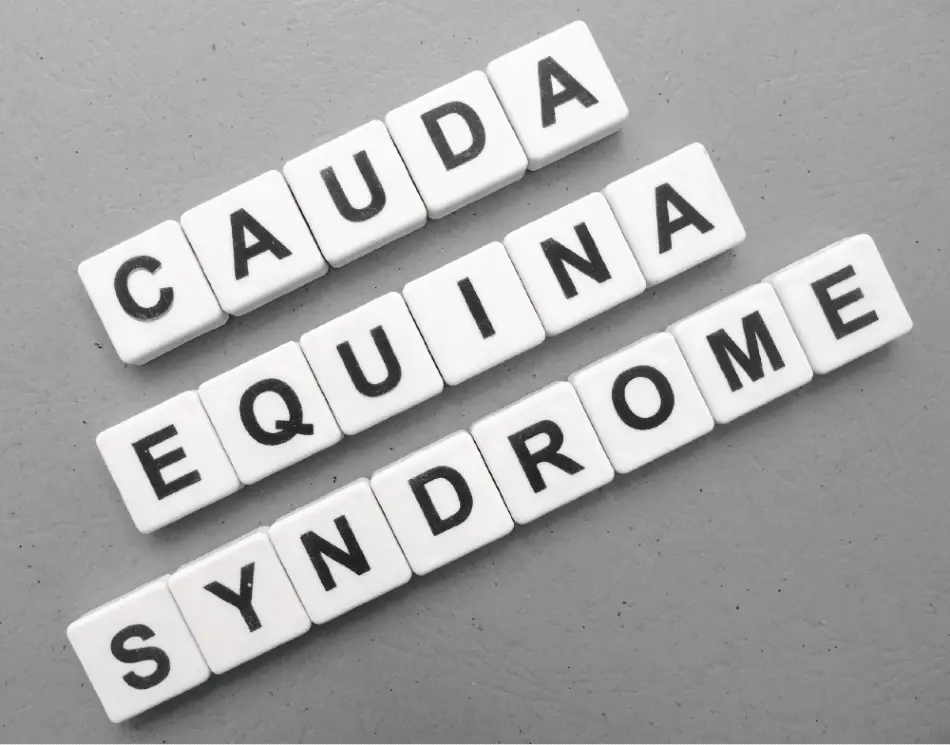Cauda Equina Syndrome (CES) is a rare but serious condition. If not diagnosed and treated quickly, CES can cause permanent nerve damage, leading to paralysis, incontinence, and life-changing disability.
Sadly, we have seen many cases where this devastating condition has been missed or misdiagnosed, leaving patients with serious and often avoidable harm.
What can you do if a specialist fails to identify Cauda Equina Syndrome in time?
What is Cauda Equina Syndrome?
Cauda Equina Syndrome happens when the nerves in the lower back become severely compressed, usually due to a slipped disc, spinal stenosis, infection, tumour, or trauma. These nerves control sensation and movement in the lower body, as well as bladder and bowel function.
Typical ‘red flag’ symptoms that should alert doctors can include:
- Severe lower back pain
- Numbness or tingling around the inner thighs, genitals, or buttocks (known as ‘saddle anaesthesia’)
- Weakness or loss of sensation in the legs
- Problems controlling bladder or bowel movements
- Sexual dysfunction
If these symptoms are present in their patient, urgent medical action is required and followed up by the doctor. This often involves an emergency MRI scan and spinal decompression surgery within hours - to prevent permanent damage.
When misdiagnosis happens
Despite clear clinical guidelines, Cauda Equina Syndrome is sometimes missed or mistaken for sciatica, a slipped disc, or another less serious spinal issue.
Other reasons a misdiagnosis may also happen could be:
- A doctor or specialist fails to recognise the warning signs
- A referral to a spinal surgeon or for an MRI is delayed
- There is poor communication between healthcare teams
- Imaging results are misinterpreted or not reviewed urgently
When this happens, the delay in diagnosis can mean that surgery is performed too late, and the outcome can be devastating. Patients can be left with serious lifelong problems such as loss of bladder and bowel control, numbness, mobility issues, and chronic pain.
What you can do if you’ve been misdiagnosed
If your Cauda Equina Syndrome was not diagnosed or treated in time, you may be able to bring a medical negligence claim. This isn’t just about financial compensation - it’s about getting answers, accountability, and the support you need to rebuild your life.
Our specialist medical negligence solicitors can:
- Review your medical records and determine whether the standard of care fell below what should reasonably have been expected.
- Obtain expert medical evidence to establish whether earlier diagnosis and treatment would have prevented or reduced your injuries.
- Help you access rehabilitation, physiotherapy, and other ongoing care.
- Secure compensation for pain and suffering, loss of earnings, future care needs, and adaptations to your home or lifestyle.
Timing is extremely important: you have three years from the date of negligence causing significant injury to start your claim. However, there are exceptions so you should check with a solicitor.
Coles Miller’s specialist solicitors
At Coles Miller, our experienced Medical Negligence team has successfully represented many clients who have suffered life-changing injuries because Cauda Equina Syndrome was not identified in time.
We understand how devastating this condition can be - both physically and emotionally. Our goal is to help you access the support, treatment, and financial security you deserve.
We can offer free initial consultations and handle most medical negligence claims on a No Win, No Fee basis.
How do No Win, No Fee cases work?
A guide to the Coles Miller medical negligence compensation claims process:
- Every claim starts with a free initial assessment by phone, or in person as you may prefer.
- After we have established that you have a claim, we will set up a No Win, No Fee funding agreement and obtain appropriate insurance cover.
- We will then obtain and review your medical records.
This next step is flexible depending on the strength of your claim (based on the available evidence):
- We may prepare a Letter of Claim and we obtain expert medical opinion and then prepare a Letter of Claim.
- We may obtain advice from a barrister.
Following service of the Letter of Claim the defendants have four months to obtain expert medical evidence and respond to the claim
Read more about the No Win, No Fee process here
Coles Miller case studies
Coles Miller has recently secured a total of £825,000 compensation for Cauda Equina victims.
Coles Miller medical negligence solicitors have secured compensation totalling £825,000 for two patients left with permanent disabling symptoms restricting mobility because of alleged failings by two GPs and two NHS Trusts.
Both victims suffered from the relatively rare condition of Cauda Equina Syndrome and sustained irreversible nerve damage because of alleged failures to diagnose the condition and treat them in time.
If you choose Coles Miller, you are in expert hands.
Get expert legal advice
If you have a medical negligence claim, please contact David Simpson, Partner and Head of the Medical Negligence at Coles Miller Solicitors.
His practice covers a wide range of medical negligence matters. David regularly deals with cases of high complexity and value; he has particular interest in cases involving Cauda Equina, vascular problems leading to amputation and mismanaged labour.
If you or someone you love has suffered because Cauda Equina Syndrome was misdiagnosed, don’t face it alone.
Contact Coles Miller Solicitors today for expert advice, compassionate support, and a clear path forward.
Call us on 01202 673011 or visit www.coles-miller.co.uk to learn more.


.png)



.webp)

